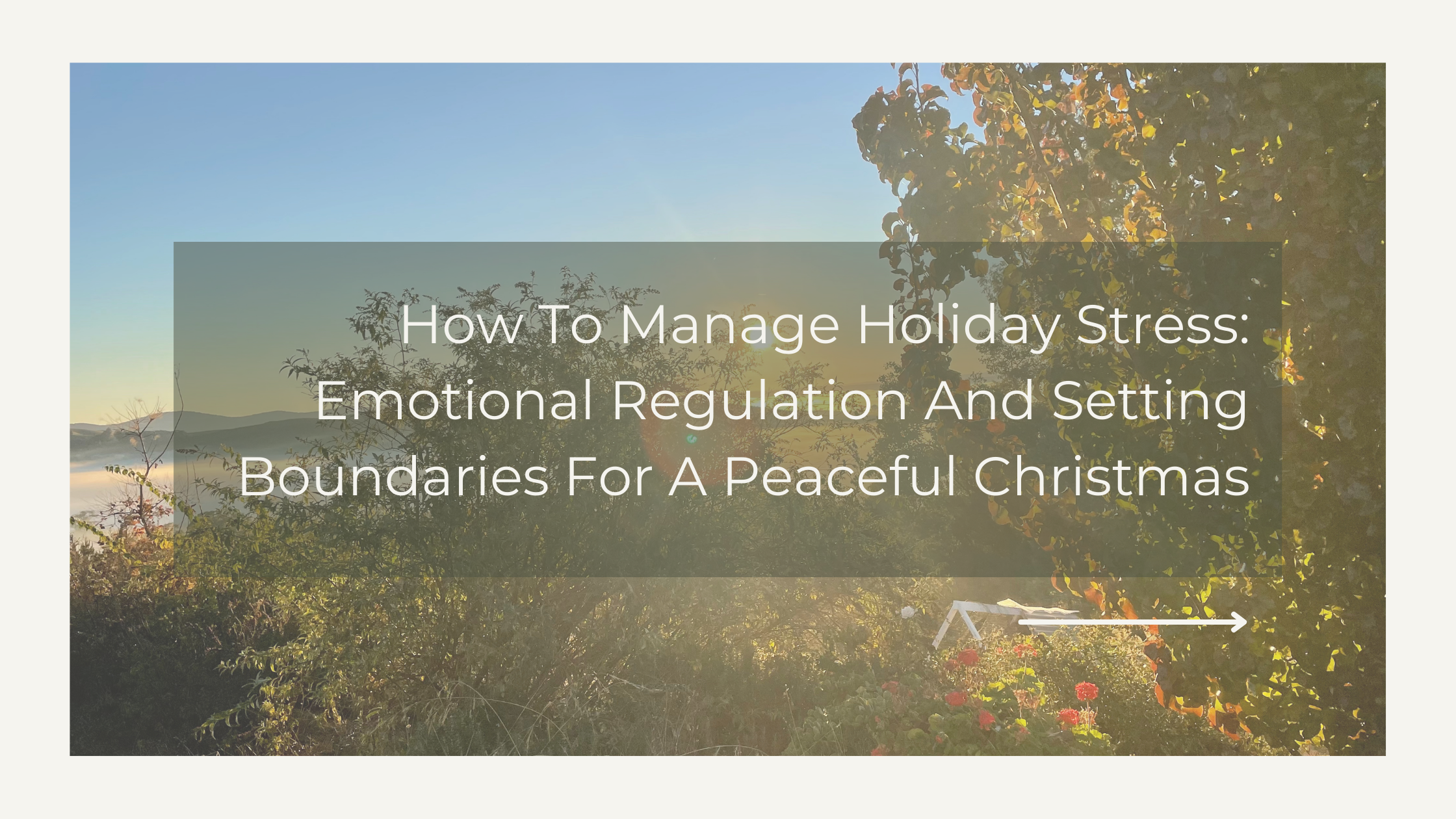How To Manage Holiday Stress: Emotional Regulation And Setting Boundaries For A Peaceful Christmas
The Christmas season is often portrayed as a time of joy, togetherness, and celebration, but for many, it can also bring a significant amount of…
The Christmas season is often portrayed as a time of joy, togetherness, and celebration, but for many, it can also bring a significant amount of stress and emotional strain. Whether it’s the pressure to meet social and family expectations, financial concerns, or navigating complex family dynamics, this time of year can be overwhelming. It’s important to acknowledge that it’s okay if the festive season feels challenging. Managing your mental health during this time is key to making it through the holidays with more peace and emotional balance.
Two vital tools in handling the stress and complexity of Christmas are emotional regulation and setting boundaries. These skills help you maintain your mental well-being, allowing you to enjoy the season on your terms without feeling drained or overwhelmed. Let’s explore how you can apply these strategies to navigate the holiday season with greater ease.
1. Understand Emotional Triggers
The first step in managing your mental health over the holidays is understanding what might trigger strong emotional responses. Christmas often brings a mix of joy and stress, and it’s essential to recognise what causes emotional discomfort for you personally.
Some common emotional triggers during the holidays include:
- Family conflict: Unresolved issues with family members or difficult dynamics
- Financial pressure: Feeling the strain of gift-giving or hosting
- Grief or loneliness: Missing loved ones or feeling disconnected in a festive crowd
- Social overwhelm: The pressure of attending numerous events or gatherings
By identifying what tends to provoke strong emotions, you can anticipate challenging situations and respond thoughtfully, rather than reacting impulsively. Try using tools like journaling or mindfulness to reflect on how you feel leading up to holiday events. You might even notice patterns in previous holiday seasons that you can prepare for.
Knowing your emotional triggers empowers you to take proactive steps, helping you face the holidays with greater resilience.
2. Practise Emotional Regulation
Once you understand your emotional triggers, it’s crucial to have tools to manage your responses in the moment. Emotional regulation involves recognising when you’re becoming overwhelmed and using strategies to regain calm and control. Here are a few techniques that can help you stay grounded during stressful holiday moments:
- Breathing Exercises: Slow, deep breathing can help calm your nervous system and lower stress levels. A simple technique is the 4-7-8 breath, where you inhale for 4 seconds, hold for 7 seconds, and exhale for 8 seconds. Practising this before or during a stressful event can help you feel more centred.
- Mindful Practices: Being present in the moment is a powerful way to reduce emotional intensity. Try to focus on small sensory experiences—like the feel of a cool drink in your hands or the sound of holiday music—to ground yourself during stressful gatherings. Mindful eating at holiday meals can also keep you focused on the present instead of spiralling into anxious thoughts.
- Self-Soothing Techniques: Have a list of comforting activities that help you unwind. This could be a walk in nature, listening to calming music, or engaging in a creative hobby like knitting or drawing. These activities can provide relief when you feel emotionally overloaded, helping you reset and recharge.
By regularly practising these emotional regulation techniques, you’ll be better equipped to handle challenging emotions when they arise, making the holiday season more manageable.
3. Setting Boundaries
The festive season often comes with numerous social obligations and expectations, which can quickly become overwhelming. Setting clear boundaries is essential to protect your mental health during this busy time. Boundaries allow you to take control of your energy and time, ensuring you don’t overextend yourself.
- Why Boundaries Matter: Without boundaries, it’s easy to feel exhausted or resentful from trying to please everyone. Boundaries help prevent emotional burnout by protecting your personal space and energy. Whether it’s declining an invitation, limiting your time at a stressful event, or controlling the flow of conversations, boundaries create a buffer between you and potentially draining situations.
- Practical Boundary-Setting Tips:
- Politely decline: It’s okay to say no to events or gatherings that feel too much. Try phrases like, “Thank you for the invitation, but I won’t be able to make it this year.”
- Limit your time: If you feel obligated to attend a family or social event, set a time limit for how long you’ll stay. “I’ll join for an hour but then I’ll need to head out” can help manage expectations.
- Gift-giving boundaries: If finances are a concern, suggest alternative arrangements like a gift exchange or homemade gifts to reduce pressure.
- Boundary Scripts: It’s helpful to have phrases prepared for moments when you need to set limits. For example, if a conversation starts to become heated, you might say, “I’d prefer not to discuss that right now,” or “Let’s talk about something else.”
Setting boundaries isn’t about avoiding people or situations; it’s about protecting your well-being and honouring your own needs. By setting clear, respectful limits, you’ll reduce stress and enjoy more of what the holiday season has to offer.
4. Managing Family Dynamics
Family gatherings during Christmas can be a joyful time, but they can also bring up old conflicts or tension. It’s not uncommon for unresolved issues to surface when everyone is together, and these dynamics can quickly become overwhelming. Here are a few strategies for navigating tricky family situations while maintaining your emotional well-being:
- Communication Strategies: To handle difficult conversations or potential conflicts, use the ‘DEAR MAN’ skill from Dialectical Behavior Therapy (DBT). This acronym stands for:
- Describe: Clearly describe the situation without judgement (e.g., “When we start talking about politics, things get heated…”).
- Express: Share how the situation makes you feel (e.g., “I feel anxious when the conversation turns that way”).
- Assert: State your needs or boundaries (e.g., “I’d prefer to keep the conversation light and avoid that topic”).
- Reinforce: Offer a positive outcome if your request is respected (e.g., “That way, we can enjoy dinner without any tension”).
- Mindful: Stay focused on the conversation without getting distracted by other issues.
- Appear confident: Be assertive and clear without aggression.
- Negotiate: Be open to compromise where necessary.
- Creating Emotional ‘Safety Zones’: If you know a family gathering will be stressful, plan breaks or safe spaces for yourself. Whether it’s stepping outside for fresh air, taking a short walk, or excusing yourself to another room for a moment of quiet, having an exit strategy can help you stay calm. You can also plan in advance how long you’ll stay at an event, so you have an end point in mind if things get overwhelming.
- Know When to Disengage: If a family member or situation is causing you emotional distress, it’s okay to disengage. Excuse yourself politely or change the subject to something more neutral. Remember, you’re not obligated to participate in conversations or situations that harm your mental health.
Managing family dynamics takes patience, but with clear boundaries and strong communication, you can protect your emotional well-being while still participating in holiday traditions.
5. Prioritise Self-Care
The holiday season is full of demands—from social events to family obligations—but it’s essential to prioritise self-care amidst the chaos. Taking care of yourself ensures that you’re not running on empty and helps you maintain a sense of peace and balance.
- Schedule Downtime: With so many activities, it’s easy to get swept up in the busyness of Christmas. Be intentional about scheduling moments of rest and relaxation. Whether it’s a quiet morning with a cup of tea, an afternoon nap, or reading a book before bed, make sure you have time to unwind and recharge.
- Create a Holiday Self-Care Routine: Consider incorporating small acts of self-care into your daily routine. This might include:
- Morning meditation or deep breathing to start the day with calm
- Journaling to process emotions and release tension
- Creative activities like knitting, drawing, or baking to provide a sense of accomplishment and relaxation
- Physical activity, such as walking or yoga, to relieve stress and boost your mood
- Set Boundaries for Self-Care: It’s important to protect your self-care time by setting boundaries around it. Let loved ones know when you need some time alone, and don’t feel guilty for prioritising your mental health. Self-care isn’t selfish; it’s essential for your well-being.
By consciously carving out time for rest and rejuvenation, you’ll be better equipped to handle the demands of the holiday season, making it more enjoyable and less stressful.
6. Ask for Help When Needed
It’s essential to remember that you don’t have to manage holiday stress on your own. Christmas can bring up complicated feelings, and reaching out for help is a sign of strength, not weakness. If you’re feeling overwhelmed, anxious, or isolated, there are several ways to seek support:
- Talk to a Trusted Friend or Family Member: Sometimes, simply talking things through with someone who understands can make a big difference. Let them know how you’re feeling and don’t be afraid to ask for help if you need it, whether it’s emotional support or practical assistance with holiday tasks.
- Seek Professional Support: If the holiday season is particularly challenging for you, consider speaking with a therapist or counsellor. Mental health professionals can offer coping strategies and help you process any difficult emotions that arise. If you’re already in therapy, continue your sessions during this period, as they can provide a safe space to navigate holiday stress.
- Utilise Support Helplines: If immediate support is needed, especially over the holidays when feelings of loneliness or distress peak, don’t hesitate to reach out to a mental health hotline. These services are often available 24/7 and provide immediate, non-judgmental support. Example services include Lifeline and Beyond Blue.
Asking for help ensures you don’t carry the burden of holiday stress alone. It’s a proactive way to take care of your mental health and find support when needed.
The Christmas season can be filled with both joy and stress, but by taking steps to manage your mental health, you can navigate it with greater ease. Understanding your emotional triggers, practising emotional regulation, and setting healthy boundaries are essential tools that will help you protect your well-being. Prioritising self-care and asking for help when needed are also vital to staying balanced and resilient during the holidays.
Remember, it’s okay to put yourself first, even during a season that often focuses on giving to others. By taking care of your mental health, you can approach Christmas with more peace, presence, and enjoyment, making it a more fulfilling time for you and those around you.
If you’re struggling with holiday stress and need extra support, consider booking a session with a therapist. We’re here to help you navigate this challenging time with strategies tailored to your unique needs. Get in touch today, or book an appointment online to work with one of our skilled psychologists.






